'Long Covid patients feel invisible and left behind'
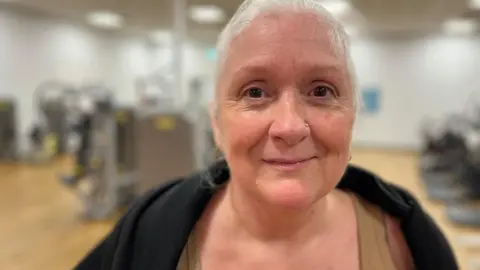 Nikki Fox/BBC
Nikki Fox/BBCWhen the coronavirus pandemic took hold in 2020, few could have predicted the number of people who would suffer long-term effects. For some, the condition persists for years.
There is no cure for long Covid - and currently no standard test. There are also more than 200 recognised symptoms, the most common being fatigue, breathlessness, and brain fog.
In Norwich, 4,800 people have been through the doors of the Post-Covid Assessment Clinic, where a group of NHS staff reassures patients they are not alone with this often invisible - and misunderstood - condition.
Here are some of their stories.
'It cost me my job'
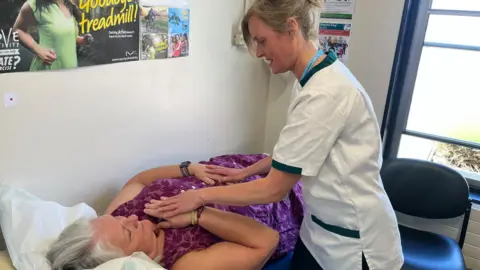 Nikki Fox/BBC
Nikki Fox/BBCHigh school science teacher Deborah Caitens-Smith was referred to the long Covid team in September 2021.
She tested positive for a second time earlier that year and was hospitalised with paralysis down one side of her body.
Ms Caitens-Smith did not have enough oxygen in her blood, suffered brain fog and could hardly walk.
"I was exhausted," she said.
"I had problems with my voice and my stamina just wasn't there, I couldn't stand up and talk to a class for an hour.
"When you've got five or six classes a day, I couldn't do it and I still can't. It's cost me my job. I had to readjust.
"I loved my kids at school."
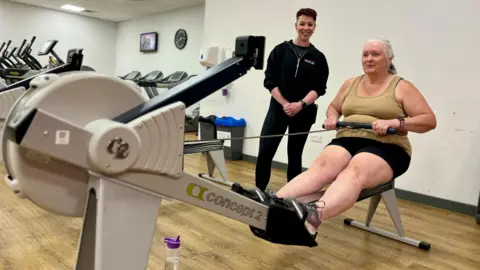 Nikki Fox/BBC
Nikki Fox/BBCWhy the symptoms of long Covid persist after the initial illness remains a mystery, according to the National Institute for Health and Care Research (NIHR).
Scientists believe either the virus does not fully clear from the body, or it results from a dysfunctional immune response. More women are affected than men.
Ms Caitens-Smith said the support the clinic offered was invaluable during some "really dark days", but because the illness has no cure, she said she felt at times like a "guinea pig".
"I've been through respiratory clinics at West Suffolk Hospital and sleep clinics at [Royal] Papworth Hospital," she said.
But it was two self-help programmes that really made a difference.
The first NHS referral - which had a two-year wait - was run by the English National Opera (ENO) called "Breathe", which teaches vocal exercises and techniques to control breathlessness.
The second was to the Active Living Programme at Brandon Leisure Centre in Suffolk to improve fitness and lung capacity.
Ms Caitens-Smith said it was important to maintain a positive attitude.
"Covid is still out there, people still get sick.
"I'm on my 10th vaccination and I get sick with every vaccination - but I can't risk getting Covid again.
"This is life changing."
'It feels like a rollercoaster'
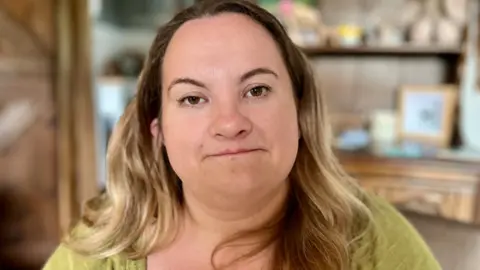 Nikki Fox/BBC
Nikki Fox/BBCIn March 2020, Mary Hines developed a nasty cold and had difficulty breathing. It almost put her in hospital.
Two years later, when the height of the pandemic was over, the 32-year-old was working as a nursing assistant in a hospital ward.
During an influx of Covid cases, she said she remembered thinking: "If I don't catch it now, I never will". Unfortunately, she did.
"I was just moving into my first house and I think the stress of it meant my immune system was low," she said.
Ms Hines said it began with a sore throat but other symptoms followed, and she developed long Covid.
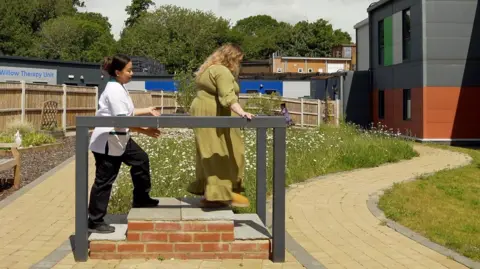 Jonny Michel/BBC
Jonny Michel/BBCPain, fatigue, and brain fog are part of her life.
Other symptoms include tremors, migraines, and Postural Tachycardia Syndrome (PoTS), when the heart rate increases quickly getting up from sitting or lying down.
"I can be talking to you," she said, "then it feels as if I'm one of those rollercoasters that go up really high, then drop.
"Sometimes brain fog is so bad, I can't string two words together."
She said the severe change to her health led to an identity crisis. Staff at the long Covid clinic were a "listening ear" and helped her plan.
Ms Hines was also referred to the ENO course and said that learning to control the panic when she struggled to breathe was "truly amazing".
She now sings at church, which has been "really beneficial" for her mental health.
"When I'm having a bad day, I can always turn to music," she said.
The clinic has advised her on eating and drinking as she is prone to choking, and "healthy swaps" to reduce foods that cause inflammation.
Ms Hines now works for a children's charity which isn't as physically demanding as nursing.
"If you want to use your life to the best of its ability, I think you've got to do something that you truly enjoy and something worthwhile, and that's what it has taught me, long Covid, that life is too short."
She said it was important to take "whatever you've been given" and "use it positively, not to settle in your setback, but to use it to spring forward".
She said she believed people could be kinder towards those with chronic illnesses.
"When I can't get my words out, it's not because I can't think of a word," she said.
"It's like the mist has gone over."
She encouraged others who were struggling to "carry on living and enjoying themselves".
"You've just got to take it, you've just got to own it."
'Pace, prioritise and plan'
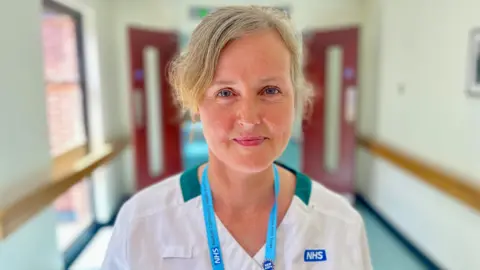 Nikki Fox/BBC
Nikki Fox/BBCA recent study said the type of biological changes found in long Covid patients included the presence of the original virus in the body, disruption of the normal immune system - and microscopic blood clotting.
But researchers don't know why.
Sara Heritage, an occupational therapist for Norfolk Community Health and Care NHS Trust, said it was challenging for healthcare professionals used to getting answers.
"We will talk through with people what their day looks like and help them to understand their energy and where they can best use it," she said.
"We're helping people to pace, prioritise and plan their day - which helps them control their symptoms."
'Patients feel invisible'
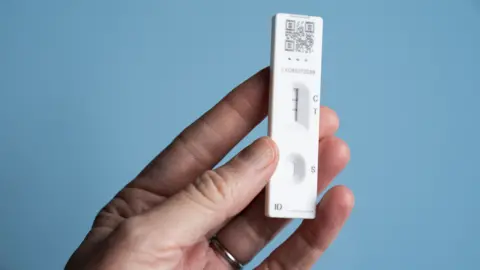 PA Media
PA MediaMs Heritage said her support team included respiratory and cardiology nurses, speech and language therapists, dieticians, physiotherapists, occupational therapists, and doctors from different areas, like cardiology and rehabilitation medicine.
About 450 people were currently awaiting assessment or intervention.
"We've had people referred to our service recently that were hospitalised with Covid 19 right at the beginning of the pandemic and they're only just being referred to us now," she said.
And there were referrals from more recent Covid patients.
"It might be that people had initial Covid infections and went back to life after that and didn't really have long Covid, but another infection on top has triggered symptoms."
Ms Heritage said some people found it challenging to deal with the implications of the illness.
"I think things like financial support for people that can't work would be beneficial," she added.
"People being believed about their symptoms, is really important.
"They feel invisible and absolutely left behind. People don't always look unwell, and it fluctuates.. it's that uncertainty that people have to deal with."
The government has invested £50m in long Covid research projects.
A spokesperson said: "Long Covid can have a debilitating impact on people's physical and mental health, and we are committed to ensuring there are quality services for everyone suffering with it, in every part of the country."
Follow Norfolk news on BBC Sounds, Facebook, Instagram and X.
